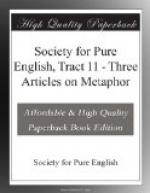between the words that compose it; and in the best
sentences, whether of prose or verse, the words seem
new-born; like notes in music, they seem to be, not
mere labels, but facts, because of the manner in which
the writer’s thought or emotion has related them
to each other. But habitual metaphor prevents
this process of relation; it is the intrusion of ready-made
matter, with its own stale associations, into matter
that should be new-made for its own particular purpose
of expression. Phrases like—The lap
of luxury, Part and parcel, A sea of troubles, Passing
through the furnace, Beyond the pale, The battle of
life, The death-warrant of, Parrot cries, The sex-war,
Tottering thrones, A trail of glory, Bull-dog tenacity,
Hats off to, The narrow way, A load of sorrow, A charnel-house,
The proud prerogative, Smiling through your tears,
A straight fight, A profit and loss account, The fires
of martyrdom, The school of life—are all
ready-made matter; and, if a writer yields to the
temptation of using them, he impedes his own process
of expression, saying something which is not exactly
what he has to say. He may, of course, attain
to a familiar metaphor in his own process of expression;
but if he does, if it is exactly what he has to say,
then it will not seem stale to the reader. Context
may give life to a metaphor that has long seemed dead,
as it gives life to the commonest words. If an
image forces itself upon a writer because it and it
alone will express his meaning, then it is his image,
no matter how often it has been used before; and in
that case it will arrest the attention of the reader.
But the effect of habitual and dead metaphor is to
dull attention. When a phrase like ‘the
lap of luxury’ catches the eye, the mind relaxes
but is not rested; for we are wearied, without exercise,
by commonplace.
Further, the use of dead metaphor weakens a writer’s
sense of the connexion between mood and manner.
All the metaphors which I have quoted are fit for
the expression of some kind of emotion rather than
for plain statement of fact or for lucid argument;
yet they are used commonly in statements of fact and
in what passes for argument. Indeed one of their
evils is that they make a writer and his readers believe
that he is exercising his reason when he is only moving
from trite image to image. If eloquence is reason
fused with emotion, writing, or speaking, full of
dead metaphors is unreason fused with sham emotion.
I add in illustration a further list of dead metaphors
lately noticed: ’Branches of the same deadly
Upas Tree. Turning a deaf ear to. The flower
of our manhood. Taking off the gloves. Written
in letters of fire. Stemming the tide. Big
with possibilities. The end is in sight.
A place in the sun. A spark of manhood. To
dry up the founts of pity. Hunger stalking through
the land. A death grip. Round pegs (or men)
in square holes. The lamp of sacrifice.
The silver lining. Troubling the waters, and
poisoning the wells. The promised land. Flowing
with milk and honey. Winning all along the line.
Casting in her lot with. The fruits of victory.
Backs to the wall. Bubbling over with confidence.
Bled white. The writing on the wall. The
sickle of death. A ring fence round. The
crucible of. Answering the call. Grinding
the faces of the poor. The scroll of fame.’—A.
CLUTTON-BROCK.




